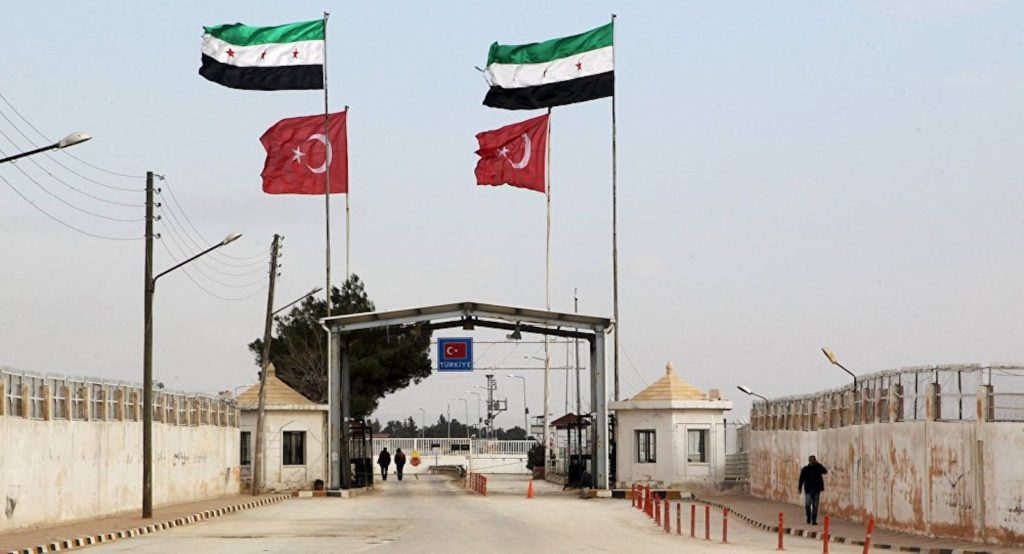The YPG in Syria on Wednesday said that its counter-terror forces have recently arrested a number of foreign Islamic State fighters trying to escape into Turkey, from where they planned to carry out suicide missions in Europe.
Over the last two weeks, ISIS foreign fighters from Tunisia, Jordan, Saudi Arabia, Turkey, Albania, Germany, Sweden, France, the United Kingdom and other European countries were arrested while trying to escape to Turkey from territory controlled by the Syrian Democratic Forces, according to the YPG general command.
Among the fighters captured near the border was Thomas Barnouin, who calls himself Abu Mohamed al-Fransi, a 36-year-old French national who was linked to jihadist attacks in France.
Three others arrested were identified as Kevin Gonot (Abu Sufyan al-Fransi), Muhamed Megherbi (Abu Maymuna al-Fransi) and Najib Megherbi (Abu Sulaiman al-Jazaeeri).
French media reported on December 28 that the YPG had captured Barnouin 10 days earlier in Hassakah along with two other French nationals, 31-year-old Romain Garnier (Abu Salama al-Fransi) and 30-year-old Thomas Collange (Abu Hussain al-Fransi).


Barnouin traveled to Syria in 2005 but was arrested in 2006 and handed over to French authorities. After serving five years in a French prison, he took his wife and two children to Syria in 2014 and joined ISIS. He is believed to be linked to the “Artigat network” behind the shooting attacks in Toulouse and Montauban in 2012 that left seven people dead and five injured. Another man jailed with Barnouin in France, Fabien Clain, claimed the 2015 Paris attacks in the name of ISIS. Clain traveled to Syria in 2014 and joined ISIS fighters in Raqqa.
In a 10-minute-long video released by YPG, Barnouin said he fought with ISIS for four years before trying to leave, when he was arrested by the group’s internal security and held in a prison for 105 days. He said he was then smuggled away with other French fighters in December 2017 and arrested by the SDF on his way to the Turkish border.
Speaking in English, Barnouin said he was initially convinced to travel to Syria by some men who came to his home in France. He then traveled from Spain to Turkey before being smuggled into the Syrian city of Latakia where he joined ISIS in February 2014.
Barnouin further claimed that ISIS foreign fighters who went to Europe from Syria entered through Turkey.
“I heard that all the ones who came to Europe from the Turkish borders … maybe for surrender, maybe for attacks, but all of them [crossed] the Turkish border,” he said.
He said he heard of no one who crossed the Jordan or Saudi borders.
Last month, Syrian Kurdish intelligence officer Ciwan Xhalil told The Times of London that “hundreds” of British foreign fighters had escaped to Turkey after Mosul and Raqqa were recaptured. The Guardian reported in September that several dozen foreign fighters had reached southern Turkish frontier towns after paying smugglers to ferry them across the porous border in Syria’s Idlib province.
“We have no information or remarks to address unconfirmed, open-source reports that ISIS terrorists are passing through Turkey and into Europe,” a spokesperson for the U.S.-led Coalition against ISIS told The Defense Post.
The spokesperson noted that Turkey “is a valued member of the Global Coalition against ISIS” and chair of the Coalition’s foreign fighter working group that “actively supports and [leads] international initiatives” aimed at targeting ISIS and other terrorists in Syria, curtailing recruitment and financing.
French foreign fighters with ISIS
The Coalition and Western officials have repeatedly warned that ISIS foreign fighters could surge into Europe to carry out attacks after the group lost territory in Iraq and Syria. Although the expected influx so far appears not to have happened, the French government estimates that about 300 of the estimated 1,700 French citizens who joined ISIS have returned to France.
French officials have indicated they will not repatriate Emilie König, a 33-year-old French national arrested last month by the Syrian Democratic Forces. König, the daughter of a police officer, had appealed publicly to be returned to France.
In a video released by the YPG on Monday, König disputed her mother’s claim that she had been interrogated and tortured while in custody. Both Barnouin’s and König’s videos were recorded while in YPG custody.
French government spokesperson Benjamin Griveaux told RMC radio on Thursday that König and other French women who married ISIS fighters should be judged in Syria if “there are legal institutions capable of guaranteeing a free trial” and assuring their right to a defense.
Under article 113-6 of the French criminal code, French judicial authorities have jurisdiction over crimes committed by a French national abroad, a concept called the active personality principle.
All French citizens who have traveled to Iraq and Syria since January 2015 to participate in the fighting, or recruitment or organization of terrorist groups are deemed to be participants in criminal association, a French diplomatic source told The Defense Post.
However, “if the individuals concerned were to be tried by the Iraqi courts, then they could not be tried for the same offenses in France,” said the source who asked not to be referred to by name.
France has extended consular assistance to some of its citizens, including a woman arrested in Mosul last year with her four children in an area controlled by ISIS. She is believed to be the wife of an ISIS fighter. The source told The Defense Post that the woman had received consular visits and France was working with Iraqi authorities to “achieve a successful outcome with respect to the humanitarian situation of these minor children.”



